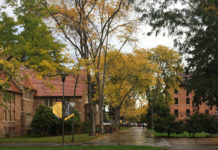By Angie Tinker
Co-Editor of Saxifrage
“Social justice” is a term that gets thrown around a lot, but we don’t always know what it means. It isn’t directly in Pacific Lutheran University’s mission statement, but it may as well be for how often students hear it around campus.
As an editor for The Matrix, PLU’s social justice publication, I obviously care about this. That said, I know what social justice means to me, and I’m not here to promote my ideas. I thought it would be best to see what a cross-section of students thought.
People in the humanities and social sciences are often up to their eyeballs in social justice literature and discussions, but what do other majors think?
It definitely has to do with equality.
“Social justice, to me, means achieving equal opportunity, not equal outcome, for everyone, regardless of race, socioeconomic class, gender, etc,” said Alexa Bayouk, a junior Music major.
Junior Kyle Parsons, a business major, agreed.
“It’s having equal opportunities for everyone,” Parsons said.
Andrea Murphy, a sophomore and music major, mentioned the importance of equality.
“Personally, social justice to me means equitably distributing resources – such as educational, occupational, and financial – for all,” Murphy said.
What does this equity mean? Some would say that it’s having a level playing field, so everyone has the same advantages.
That’s not it, though. We can’t yet give everyone the same chances, because differences in privilege mean some people get more than others.
Maricel Fee, a junior studying Geosciences, noted that social justice needs equity.
“Equality in terms of privileges as well as economics,” Fee said.
Maylen Anthony, a junior in Hispanic studies, agreed.
“I think social justice is the recognition of your own privilege and ways that you are oppressed, then utilizing them in order to better the common good,” Anthony said.
So, how does privilege look? Just like differential calculus in physics, it’s complicated. Briefly, though, people get treated differently just based on who people think they are. If I walked into the Old Main Market in a burglar outfit, you’d better believe the baristas would treat me differently than if I entered with a nice dress and my makeup on point. That simple situation exemplifies an important idea: people will assume different things about you just by what they think they know.
“[Social justice is] often brought up in the context of suppression,” said junior Kalie Saathoff, a Chemistry major.
“Especially with respect to race, sexuality, and class.”
These labels and more all have baggage.
Bayouk notes her own position in society and the privilege she gets.
“As a middle class white female. I’ve never found myself to be a victim of social inequality”, Bayouk said.
Equality, equity, and privilege is what social justice is made of, at least according to a variety of different PLU students. It’s not all gloom and doom for society, though. These aspects can be used for that other big PLU word — “vocation.”























